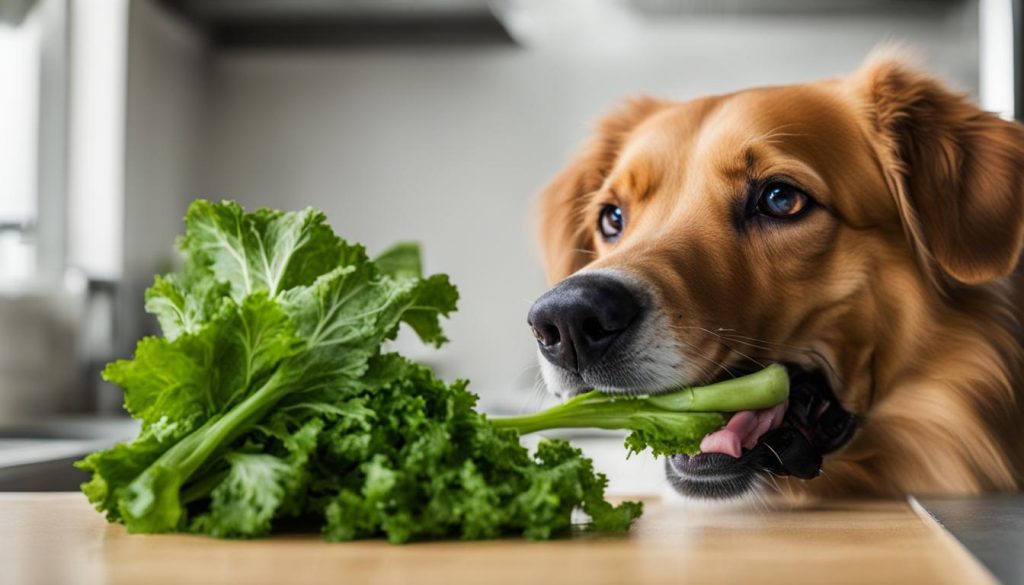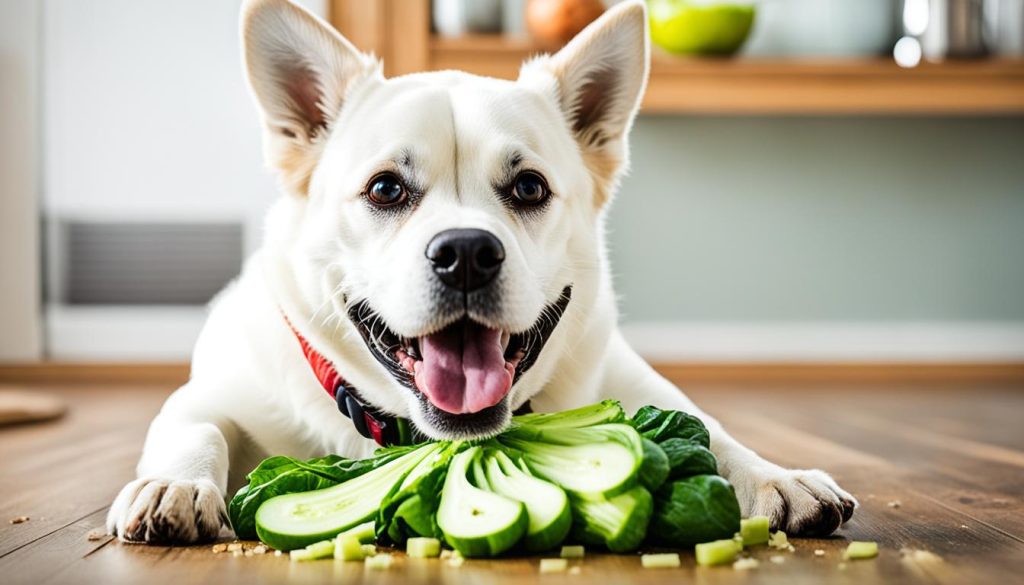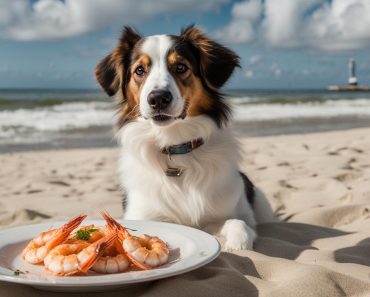As a dog owner, I always want to ensure that I am providing my furry friend with the best possible nutrition. That’s why I often find myself researching different human foods to see if they are safe and beneficial for dogs. One vegetable that has caught my attention is bok choy. I was curious to know if dogs can eat bok choy and whether it has any health benefits for them. So, can dogs eat bok choy? Let’s find out.
Bok choy is indeed safe for dogs to eat, and it can actually be a healthy addition to their diet. This leafy green vegetable is packed with nutrients that can support a dog’s overall health and well-being. However, it’s important to note that before introducing any new food into your dog’s diet, it’s always best to consult with your veterinarian to ensure it is suitable for your dog’s specific needs.
Bok choy is high in antioxidants, which can help support a dog’s immune system. It also contains significant amounts of vitamin A and folate, both of which are essential for cell growth. Additionally, bok choy can be beneficial for dogs with hypothyroidism. This vegetable can provide them with the necessary nutrients to support their thyroid function.
When feeding bok choy to dogs, it’s important to take a few precautions. First, remove the stalks, as they do not have much nutritional value for dogs. Then, cut the leaves into smaller pieces to aid in digestion. Bok choy can be served raw or cooked, but if cooked, it should be free of oils and seasonings. You can even puree the bok choy and freeze it as a frozen treat for your furry friend.
Can Dogs Eat Bok Choy? Yes, they can with proper precautions.
- Bok choy is safe for dogs to eat, but always consult with a vet before introducing any new food into their diet.
- Bok choy is high in antioxidants, vitamin A, and folate, providing several health benefits for dogs.
- When feeding bok choy to dogs, remove the stalks and cut the leaves into smaller pieces for easier digestion.
- Bok choy can be served raw or cooked, but if cooked, it should be free of oils and seasonings.
- Monitor your dog for any adverse reactions or digestive issues after introducing bok choy into their diet.
Is Bok Choy Safe for Dogs?
Bok choy is a safe vegetable for dogs to enjoy, but it should be given in moderation. It provides various health benefits and is rich in antioxidants, vitamin A, and folate. However, it’s crucial to introduce bok choy slowly into your dog’s diet and observe for any allergic reactions or digestive issues. Consulting with a veterinarian is essential, especially if your dog has specific health conditions or dietary restrictions.
If you’re wondering, “Can dogs eat bok choy?”, the answer is yes, but with some precautions. Start by offering small amounts and monitor your dog’s reaction. If there are no adverse effects, you can gradually increase the serving size. Remember that every dog is different, and individual tolerances may vary.

When feeding bok choy to dogs, it’s best to include it as part of a balanced diet. It should not replace their regular dog food, which is specially formulated to meet all of their nutritional needs. Bok choy can be a tasty and nutritious addition to their meals, but it should not be the sole source of nutrition.
Benefits of Bok Choy for Dogs
Bok choy offers numerous nutritional benefits for dogs. Its high antioxidant content helps support a healthy immune system and protects against cellular damage. Vitamin A promotes good vision, while folate is essential for healthy cell growth and metabolism. Including bok choy in your dog’s diet can contribute to their overall well-being.
Serving Bok Choy to Dogs
When feeding bok choy to dogs, it’s important to prepare it properly. Remove the tough stalks, as they do not provide nutritional value. Cut the leaves into smaller pieces to facilitate digestion. You can serve bok choy raw or cooked, but if cooking it, avoid using oils and seasonings that may be harmful to dogs. Steaming or boiling bok choy is a safe cooking method for dogs.
The Nutritional Benefits of Bok Choy for Dogs
Bok choy is not only a flavorful addition to our meals but also a nutritious vegetable that can provide several essential nutrients for our furry friends. When it comes to the health of our dogs, it’s essential to understand what foods can benefit them. Bok choy is one such vegetable that can contribute to their overall well-being.
Bok choy is rich in several vitamins that play a crucial role in supporting various aspects of dog health. Firstly, it is a great source of vitamin A, which promotes healthy vision and aids in maintaining a robust immune system. Additionally, bok choy is packed with vitamin C, an antioxidant that helps boost the immune system and fights free radicals that can harm the body’s cells.
Furthermore, this leafy green vegetable contains an abundance of vitamin K, which is vital for proper blood clotting and bone health in dogs. Vitamin B6, another nutrient found in bok choy, is essential for the metabolism of proteins and carbohydrates and helps support a healthy nervous system.
The Nutritional Benefits of Bok Choy at a Glance:
- Rich in vitamin A for healthy vision and immune function.
- Packed with vitamin C, an antioxidant that supports the immune system.
- Abundance of vitamin K for proper blood clotting and bone health.
- Contains vitamin B6, essential for metabolism and a healthy nervous system.
While bok choy offers these nutritional benefits, it’s crucial to remember that it should not replace a balanced and complete dog food that is specifically formulated to meet their nutritional needs. Bok choy can be a healthy addition to their diet, but it should be given in moderation and as part of a well-rounded meal plan.
In the next section, we will explore how to safely feed bok choy to dogs, ensuring they can enjoy its nutritional benefits while minimizing any potential risks.
How to Safely Feed Bok Choy to Dogs
When it comes to feeding bok choy to dogs, taking the right precautions is essential to ensure their safety and well-being.
The stalks of bok choy do not provide much nutritional value for dogs, so they can be omitted from their meals unless your furry friend enjoys the satisfying crunch they offer.
The leaves of bok choy, on the other hand, can be a nutritious addition to your dog’s diet. They can be served raw or cooked, depending on their preference.
If you choose to serve bok choy leaves raw, it’s important to cut them into smaller, manageable pieces that are easier for your dog to chew and digest.
If you prefer to cook the bok choy leaves, boiling or blanching them is recommended. This helps to soften the leaves and make them easier for your dog to consume. It’s crucial to ensure that the cooked bok choy is free from any oils or seasonings, as these can be harmful to your furry friend.
Steamed bok choy is another safe option for dogs. The gentle steaming process helps retain the nutrients while making the leaves tender and palatable for your pet.

After introducing bok choy into your dog’s diet, it’s important to monitor them closely for any signs of adverse reactions or digestive issues. Every dog is different, so it’s crucial to pay attention to how your specific pet reacts to bok choy.
By following these guidelines and making informed decisions about feeding bok choy to your dog, you can ensure that they can safely enjoy the nutritional benefits of this leafy green vegetable.
Can Dogs Eat Baby Bok Choy and Bok Choy Plants?
Dogs can safely eat baby bok choy, but it’s important to feed it in smaller quantities to avoid any potential stomach upset. Similar precautions that apply to regular bok choy should be followed, such as serving it raw and without oils or seasonings. It’s also worth noting that dogs can consume the green leaves and stems of bok choy plants. However, it is recommended to use organic bok choy or organic vegetables in general to minimize the risk of exposing dogs to harmful pesticides or chemicals.
As with introducing any new food into a dog’s diet, it is essential to monitor their reaction. If you notice any digestive issues or other concerns, it is best to consult with a veterinarian. They can provide personalized advice based on your dog’s specific needs, health conditions, and dietary restrictions.
Feeding baby bok choy and bok choy plants to dogs can offer a variety of health benefits due to their nutrient content. Just remember to introduce these foods gradually and ensure they are prepared and served in a manner that is safe and appropriate for your furry friend.
Conclusion
Overall, bok choy can be a wonderful addition to your dog’s diet, providing them with a host of nutrients and health benefits. With its high antioxidant content and rich sources of vitamins A, C, and K, bok choy can support your dog’s immune system, vision, and overall well-being. However, it is important to remember that moderation is key when feeding bok choy to dogs.
Before introducing bok choy or any new food into your dog’s diet, it is always advisable to consult with a veterinarian. They can provide valuable guidance based on your dog’s specific health needs and dietary requirements. A vet can help determine if bok choy is safe for your dog and how much should be included in their meals.
When feeding bok choy to your furry friend, it is crucial to follow proper preparation guidelines. Remove the stalks, as they have little nutritional value, and cut the leaves into smaller, more manageable pieces. You can serve bok choy either raw or cooked, but if cooking, avoid using oils and seasonings. Steaming or blanching bok choy is a safe cooking method for your dog.
Bok choy can be a healthy and enjoyable addition to your dog’s diet, but always consult with a vet and feed it in moderation. By taking the necessary precautions and following the recommended guidelines, you can safely incorporate bok choy into your dog’s meals and provide them with a diverse and nutritious diet.






